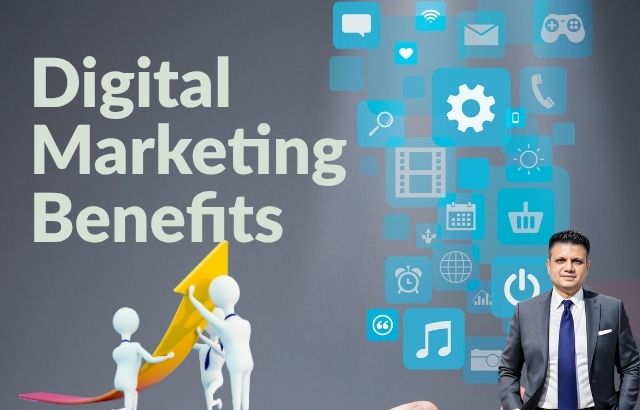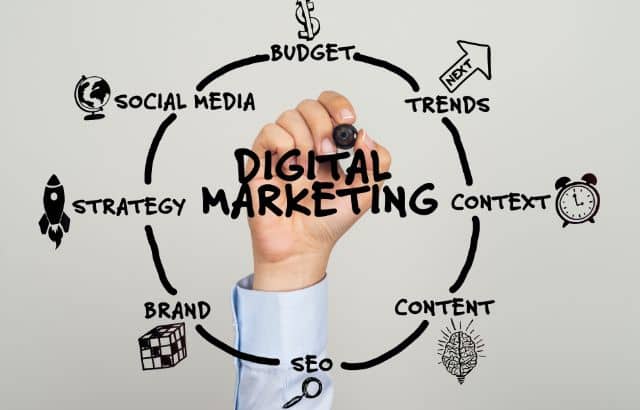Digital marketing has become a game-changer, offering companies the tools to enhance brand visibility, engage with customers in real time, and drive measurable growth. From social media campaigns to targeted ads, digital marketing allows businesses to reach broader audiences, optimize their marketing efforts, and improve overall profitability. This shift from traditional marketing to digital strategies has not only helped companies survive but also thrive in an increasingly connected world.
Hirav Shah, a seasoned digital marketing expert, breaks down the key ways digital marketing has empowered businesses to adapt and flourish in the digital age.
Table of Contents
1. Digital Marketing Benefits – Increased Reach and Visibility
One of the standout advantages of digital marketing is its ability to increase a company’s reach. By leveraging social media platforms, search engine optimization (SEO), and online advertising, companies can target specific demographics and expand their customer base. Through techniques like geo-targeting and interest-based segmentation, digital marketing allows businesses to connect with potential customers from all corners of the globe.
Example:
A small boutique can use Instagram and Facebook ads to target people in a specific city or those interested in fashion. With these targeted ads, the boutique can reach an audience that might not otherwise have known about their products.
Stats:
- 81% of people conduct online research before making a purchase decision (Source: Nielsen).
- 72% of marketers believe that their digital marketing efforts directly contributed to revenue growth (Source: HubSpot).
2. Digital Marketing Benefits – Cost-Effective Advertising
Traditional advertising methods like TV, radio, and print ads can be costly, especially for small businesses. Digital marketing offers more affordable alternatives, such as pay-per-click (PPC) ads, social media ads, and email marketing. These platforms allow businesses to control their budgets and only pay for the clicks, impressions, or actions generated.
Example:
A local coffee shop could run Facebook ads with a daily budget of $5, specifically targeting coffee enthusiasts within a 10-mile radius. This ensures a direct connection with potential customers without breaking the bank.
Stats:
- Companies that utilize email marketing generate $42 for every $1 spent (Source: DMA).
- 70% of marketers say PPC has helped them generate more sales (Source: WordStream).
3. Digital Marketing Benefits – Targeted Marketing
Digital marketing enables hyper-targeted advertising. By using data-driven strategies and insights, companies can create highly personalized marketing campaigns. They can analyze customer behavior, demographics, and preferences, enabling them to deliver tailored messages that resonate with the target audience.
Example:
An online skincare brand could use data to segment their audience based on age, skin type, and concerns, and create personalized email campaigns that offer solutions for specific skincare needs.
Stats:
- 80% of consumers are more likely to make a purchase when brands offer personalized experiences (Source: Epsilon).
- 61% of marketers say that improving personalization is their top priority (Source: Evergage).
4. Increased Customer Engagement
Digital marketing is about more than just reaching new customers—it’s also about fostering deeper relationships with existing ones. Platforms like social media, email newsletters, and online forums give businesses the opportunity to engage with customers in real-time. This helps build trust, answer queries, and create loyal brand advocates.
Example:
A fitness brand could use Instagram Stories to run live Q&A sessions, answer customer queries, or offer workout tips. This increases engagement and makes the brand feel more relatable.
Stats:
- 90% of consumers say they would buy from a brand they follow on social media (Source: Sprout Social).
- 64% of consumers expect brands to interact with them in real time (Source: HubSpot).
5. Measurable Results
Unlike traditional marketing, digital marketing offers the ability to track and measure performance in real time. Businesses can use analytics tools to monitor website traffic, conversion rates, customer behavior, and the effectiveness of their campaigns. This data allows businesses to fine-tune their strategies and make informed decisions that improve their ROI.
Example:
An e-commerce store can track the exact number of clicks on a product, the conversion rate, and which traffic sources are leading to the highest sales. If a particular ad is performing well, the company can allocate more budget to that campaign.
Stats:
- 49% of companies that use analytics are more likely to achieve above-average growth (Source: Forbes).
- 61% of marketers use A/B testing to optimize digital campaigns (Source: Econsultancy).
6. Enhanced Brand Awareness
With a consistent presence across multiple digital channels, businesses can significantly enhance their brand awareness. From social media to search engine optimization (SEO), digital marketing helps companies build a recognizable and trustworthy brand identity, which is essential in today’s competitive marketplace.
Example:
A tech startup can leverage YouTube videos, blog posts, and Twitter discussions to build thought leadership, positioning themselves as experts in their field, and enhancing their brand visibility.
Stats:
- 59% of consumers say they are more likely to trust a brand they follow on social media (Source: Sprout Social).
- 52% of users search for a brand before visiting a store (Source: Google).
7. Competitive Advantage
Digital marketing gives businesses the tools to gain a competitive edge. By staying up-to-date with the latest digital trends, utilizing data analytics, and creating innovative online campaigns, businesses can outpace competitors who still rely on outdated marketing methods.
Example:
A clothing retailer could use AI-driven chatbots on its website to assist customers 24/7, providing a seamless shopping experience that sets them apart from competitors who don’t offer similar features.
Stats:
- 53% of businesses invest in digital marketing to stay ahead of competitors (Source: Statista).
- 90% of companies agree that digital marketing helps them build stronger relationships with customers (Source: Smart Circle).
FAQs About Digital Marketing
Q1: Why is digital marketing essential for businesses today?
A1: Digital marketing offers businesses the opportunity to reach larger audiences, engage with customers more effectively, and track results in real time. This is especially important in today’s competitive, technology-driven landscape.
Q2: How does digital marketing help small businesses?
A2: Digital marketing allows small businesses to compete with larger companies by providing cost-effective marketing solutions like social media ads and SEO. It also helps small businesses reach targeted audiences and engage with customers on a personal level.
Q3: What are some digital marketing strategies that businesses should focus on?
A3: Some effective strategies include content marketing, search engine optimization (SEO), social media marketing, email campaigns, and pay-per-click (PPC) advertising.
Q4: How do businesses measure the success of their digital marketing campaigns?
A4: Businesses can use tools like Google Analytics, social media insights, and email marketing reports to track metrics like website traffic, conversion rates, customer engagement, and sales performance.
Conclusion
Digital marketing is no longer a luxury—it’s a necessity for businesses looking to thrive in the modern landscape. By embracing strategies like increased reach, cost-effective advertising, targeted marketing, and measurable results, businesses can not only survive but achieve long-term growth. As Hirav Shah highlights, staying ahead of the digital curve is essential to maintaining a competitive edge in today’s market. Through smart digital marketing practices, businesses can secure their place in the evolving digital era and set themselves up for future success.



















